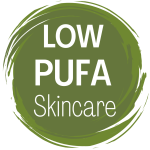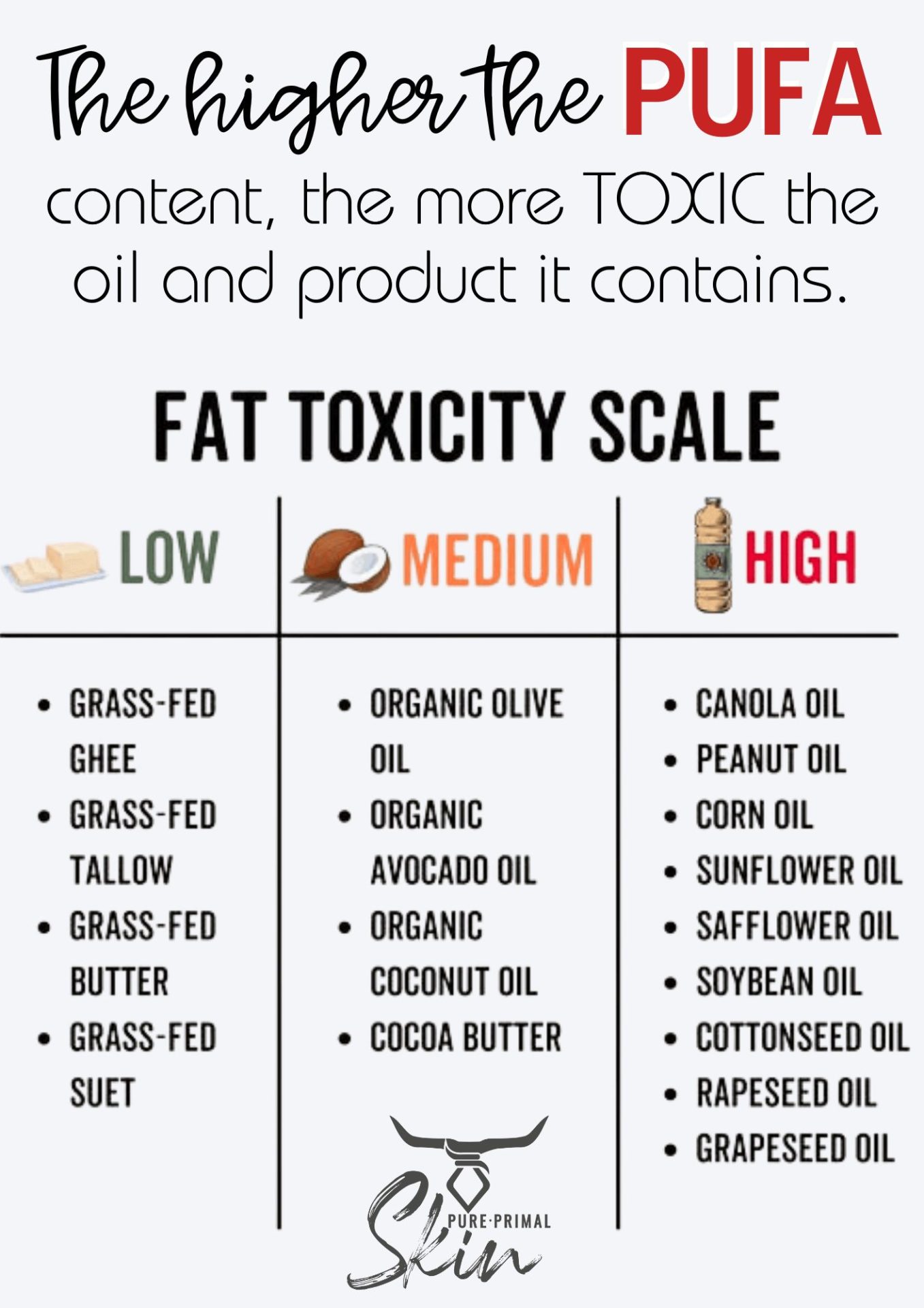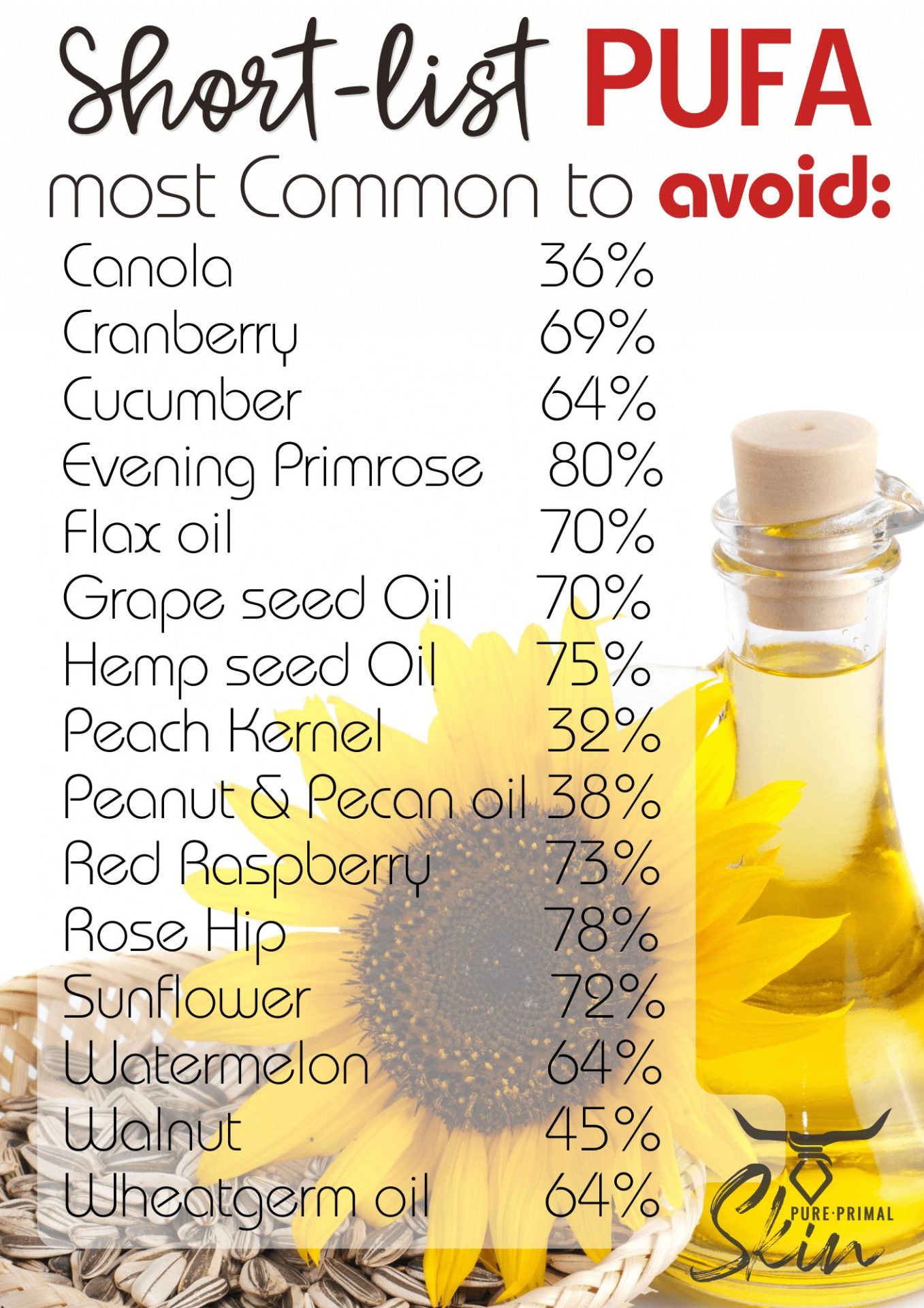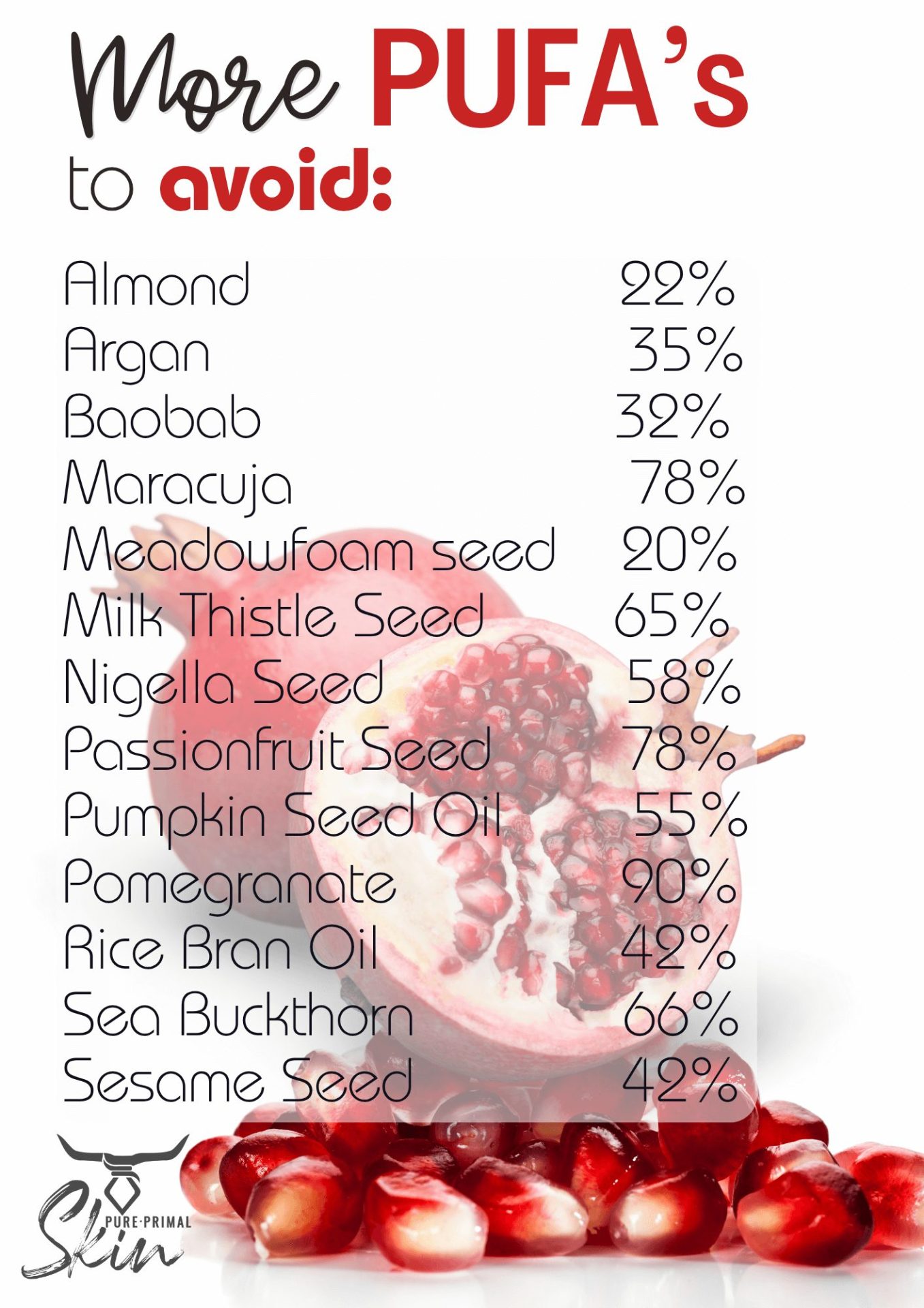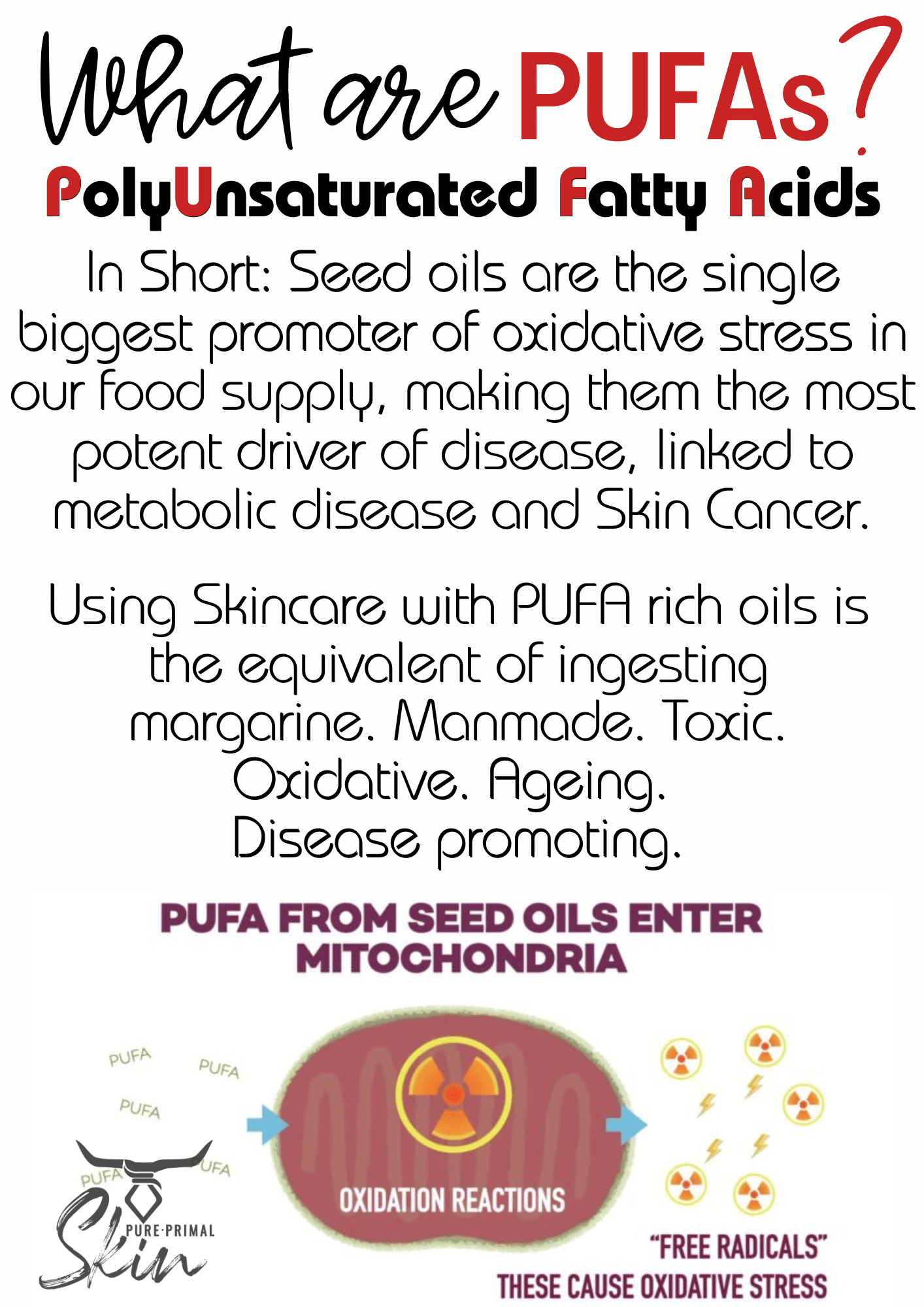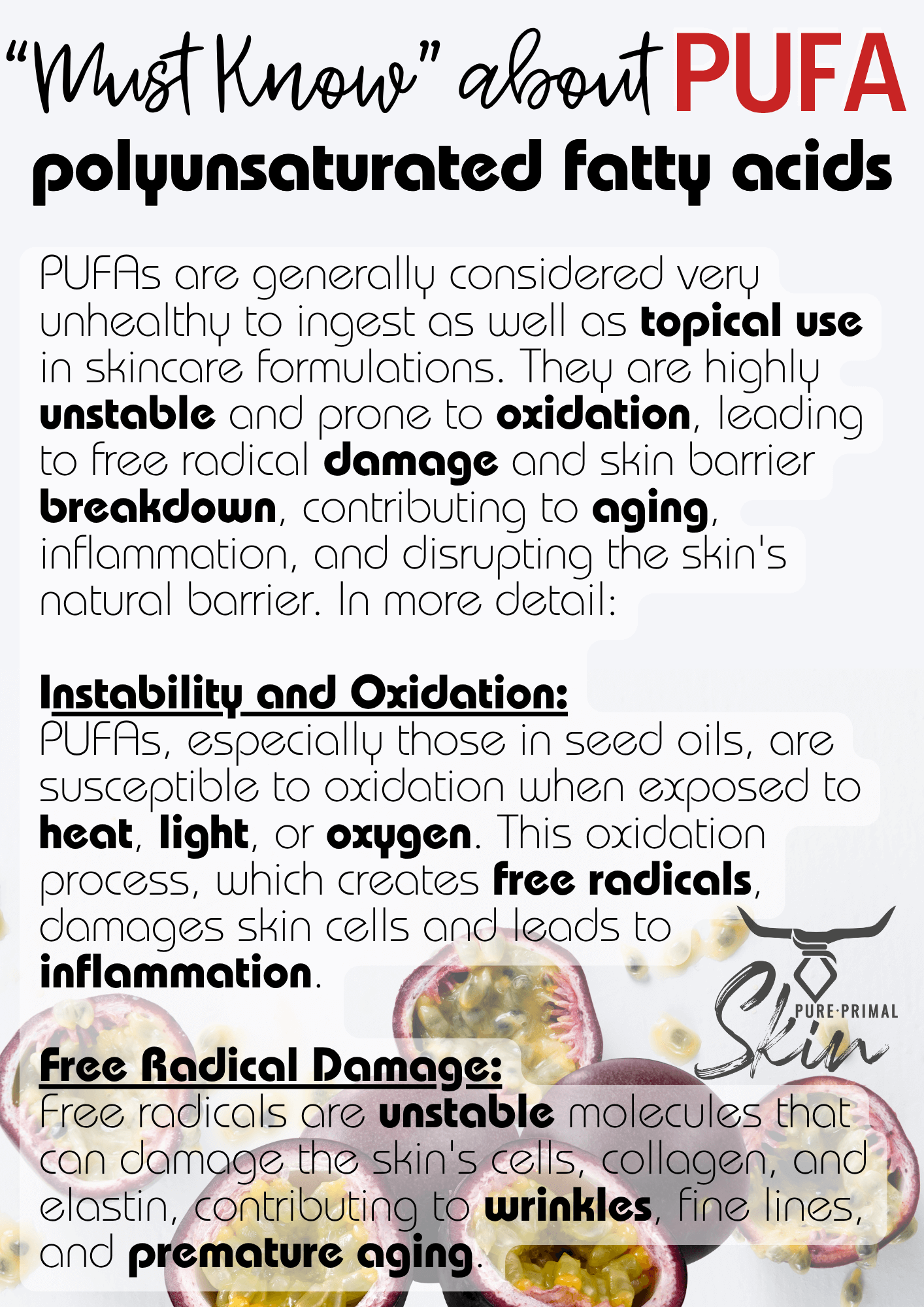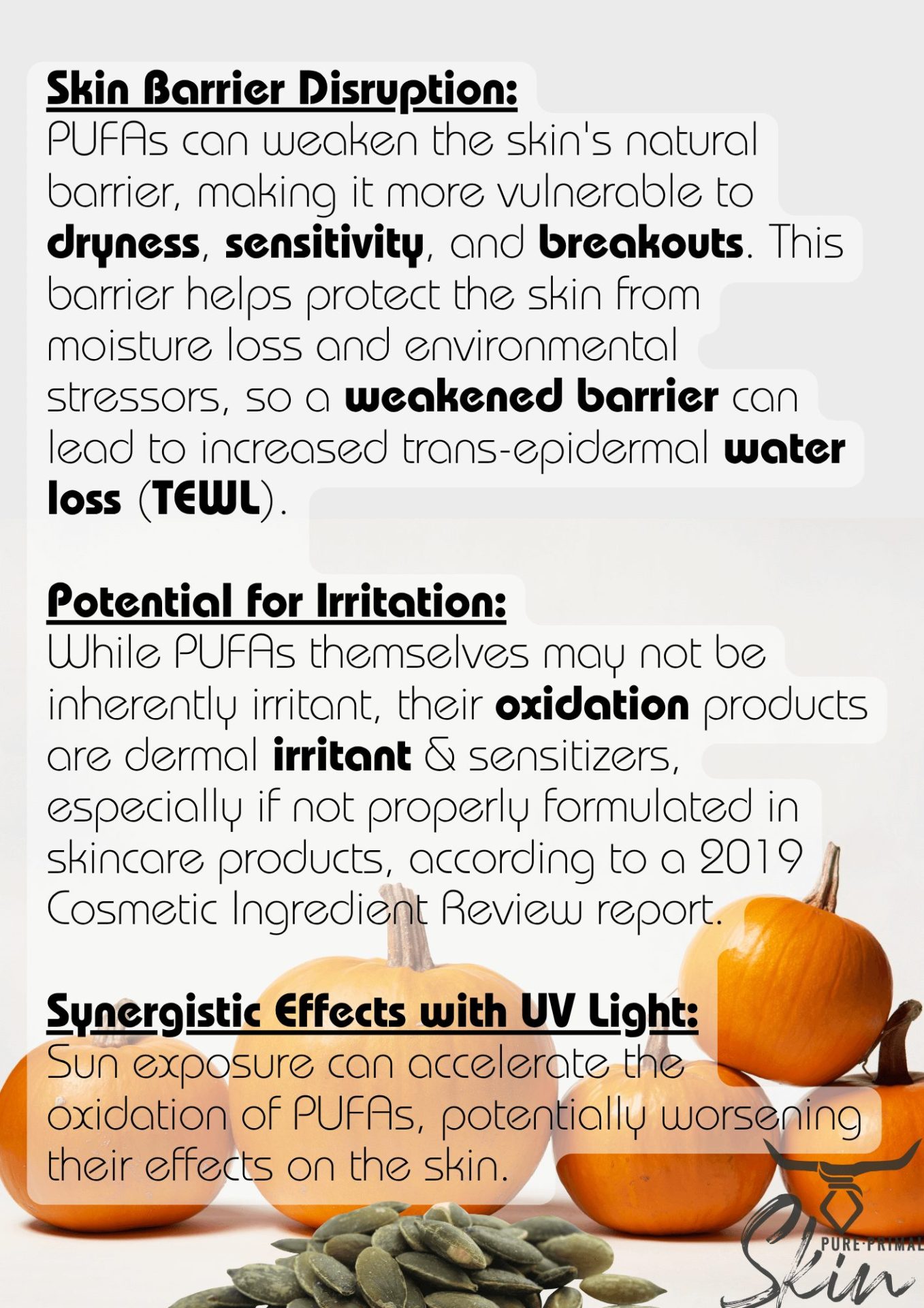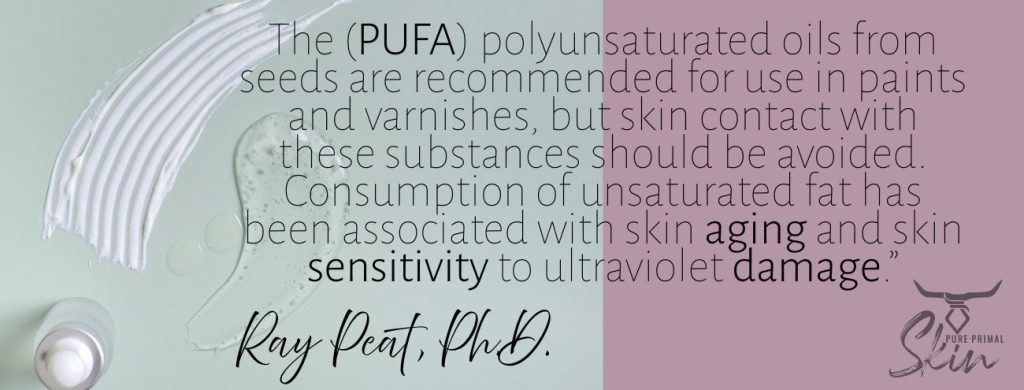Pure Primal Skin – NEW Low PUFA Skincare Formulations
After months of sifting through research information, all the oil ingredients in the
Pure Primal Skin products were re-evaluated. Based on the information, some oils were discarded. Others now feature more prominently.Why this change? Why re-formulate products?
It is all about the PUFA levels of the oils added to our tried and trusted Grass Fed, Free Range TALLOW.
We need LOW PUFA levels in skincare products to rejuvenate and maintain a healthy skin!
Does that mean the previous PURE PRIMAL SKIN product formulations were High PUFA (‘bad’)?
The anwer is an emphatic NO.
The Tallow based products have always been Low PUFA formulations. The Oils based products varied from medium to medium/low.
Besides the PUFA content of each of the oil ingredients, the total product PUFA content (level) is determined also by the quantity of inclusion of the oils that have a higher PUFA content.
With this reformulation of the full range of skincare products the PUFA content of the Tallow based Pure Primal Skin products are now even lower PUFA than before.
The Pure Primal Skin Oil based products are now all Low PUFA formulations.

PUFA’s are Polyunsaturated Fatty Acids
For the past 50-60 years the drive was toward using more PUFA’s – polyunsaturated fatty acids (seed oils) – for just about everything!
The seed oil producing industry told us it was the ‘best’ to use – the more unsaturated, the better and healthier… They even sponsored studies to ‘prove’ that we need to move away from using mainly saturated (tallow) and mono-unsaturated fatty acids (olive oil) – which humanity ingested and used topically for centuries – to the highly oxidative polyunsaturated fatty acids they were selling to us in plastic bottles.
We are faced with the challenge of re-educating ourselves when it comes to saturated vs polyunsaturated fatty acids.
We can no longer believe the results of online searches that say ‘healthy fats/oils’ are polyunsaturated fats and ‘unhealthy/bad fats’ are saturated fats.
Seed oils are the single biggest promoter of oxidative stress in our food supply, making them the most potent driver of disease.
As the use of polyunsaturated fatty acids increased over the span of the last 5-6 decades, we’ve seen an exponential increase in cancers (including skin cancers), heart disease, metabolic disease & obesity, autoimmune diseases, skin disorders and a long list of other health related problems.
More and more evidence are emerging that the type of oils/fats we ingest also have a direct impact on skin health and sun sensitivity!
Many, if not most, of the so-called ‘anti-aging’ and ‘natural’ skincare products are full of these PUFA’s.
Using Polyunsaturated Fatty Acids (PUFA’s) in skincare is equivalent to your skin ingesting margarine – it is toxic, unhealthy and causes oxidative stress to the skin cells.
Skincare starts with the type of fats & oils we consume/ingest daily.
Endocrine physiologist Dr. Ray Peat explains that eating too many PUFAs can increase many health risks:
“The food-derived polyunsaturated fatty acids play important roles in the development of all of the problems associated with aging—reduced immunity, insomnia, decreased learning ability, substitution of fat for muscle, susceptibility to tissue peroxidation and inflammation, growth of tumors, etc., and are probably involved in most other health problems, even in children.”
There is a correlation between Seed Oil (high PUFA’s) consumption and sun damage to our skins.
To understand how diet affects our ability to tan and our tendency to burn, as well as wrinkle, we need to know that skin has several layers. The deeper layer of our skin consists mostly of supportive collagen. Most of our body fat sits right below this collagen-rich layer, and our diet influences its chemistry. On a high-seed oil (PUFA) diet, our body fat has a different chemistry than on a low-seed oil diet, and it magnifies the inflammatory effect that occurs with sun exposure.
A little bit of inflammation is a good thing. Inflammation triggers the skin cells to release a protective, darkening pigment called melanin. This is what makes us look tanned. When our skin cells experiences too much inflammation it may be so damaging that our skin is unable to manufacture the tanning melanins. The amount of melanin pigment varies depending on our genetics. Some people cannot develop a tan until after they have completely eliminated dietary seed oils, i.e. switched from PUFA’s to saturated fats (tallow, coconut oil) and mono-unsaturated fats (olive oil, MCT oil).
Seed Oil Eaters experiences more inflammation = More oxidative stress and damage to their skin’s collagen layer and a reduction in the skin’s ability to repair this collagen layer over time, thus they experience faster skin aging – more wrinkles and loss of elasticity.
What about the products we apply topically on our skins everyday?
Why Your Skincare Should be Low in PUFA’s
Your skin literally ‘eats’ the products you apply to it. While most cooking seed oils are not easily absorbed by your skin, the ‘finer’ oils like Grape Seed Oil, Rosehip and Argan Oil are widely being used in skincare, especially natural skincare. These are usually ‘rich’ in Linoleic Acid – the most abundant and unstable PUFA!
Why? Because they’re relatively cheap, abundant and easy to formulate with.
PUFAs are inherently unstable. The more double bonds an oil contains, the more susceptible it is to oxidation – that means it reacts with light, heat, and air almost immediately after extraction.
Oxidised oils don’t nourish. They inflame – the root cause of inflammation is oxidation. They age your skin. They harm the skin barrier. This isn’t theoretical – it’s a biochemical reality.
What’s marketed as “nourishing” could actually be the reason your skin is breaking out, becoming sensitised, or aging prematurely.
Inflammation damages the skin’s collagen, increasing the appearance of wrinkles, thinning the skin and also damaging the natural skin barrier needed to keep your skin hydrated.
According to research from British Journal of Dermatology, applying PUFAs topically including linoleic acid can lead to increased trans-epidermal water loss (TEWL) and decreased barrier function. This can lead to dryness, itching and a decreased ability to protect the skin from environmental stressors.
PURE PRIMAL SKIN is committed to provide you with healthy skincare, low in PUFA’s, to ensure your skin get’s the best skin nutrition possible.
See our Good Ingredients with Low PUFA content.
Want to know/read more? Articles on the effects of PUFA consumption and use in skincare products.
- Absolutely Pure – Reasons for Low PUFA Skincare
- Tuttofare – Seed Oils are Bad for your Skin
- Saturee – Georgi Dinkov (and Dr. Peat) – On the topic of Topical Skincare
- Dr Cate – Seed Oil make Sunburn worse
- Dr Cate – PUFA Project – Scientific References on Seed Oil Toxicity
- Dr Cate – Why are Seed Oils Unhealthy
- Frontiers – Seed Oils link to Metabolic Disease & Cancer
- ZeroAcre – Are seed oil toxic?
- Dr Ray Peat – Unsaturated Fatty Acids : Nutrititionally Essential or Toxic?


